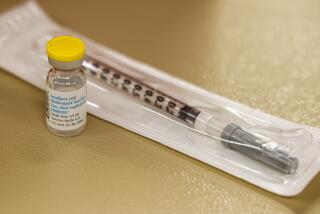AIDS Specialists Push Overhaul of Drug Tests
- Share via
A high-powered group of AIDS physicians will propose this week a significant overhaul in the way drugs are tested in the United States in an attempt to make experimental AIDS drugs more widely accessible and to reduce the time it takes to determine whether they work.
The physicians intend to discuss with members of the pharmaceutical industry whether it might be possible to test AIDS drugs in community-based practices throughout the country instead of primarily in a few large, academic centers in metropolitan areas.
They also plan to consider establishing a confidential national registry for patients and physicians willing to participate in AIDS drug trials--an effort some say could cut the time it takes to get trials on line, accelerating the entire process.
The proposals, by members of a new national organization of physicians who together have cared for more than 23,000 people with AIDS and AIDS-related complex, come amid growing concern about the dearth of AIDS treatments and about limited access to experimental drugs.
Critics say many people infected with the acquired immune deficiency syndrome virus have had no access to promising treatments because drug trials have been concentrated in relatively few cities--those with sophisticated medical centers, numerous AIDS cases and aggressive researchers.
They also contend that drug trials have often been slow in coming, in part because of the traditional drug testing and approval system. Among other things, some have suggested that there be a reduction in the time taken to recruit patients for clinical trials.
“Most of the future care is not going to be in acute general hospitals but in ambulatory settings,” said Dr. Leonard D. Fenninger, a former associate director of the National Institutes of Health and a trustee of the newly formed Physicians Assn. for AIDS Care. “So one needs to set up protocols and studies that will make use of the settings and circumstances in which patients actually occur.”
Fenninger said the proposals, if they prove possible, might require some small modifications in the regulations of the U.S. Food and Drug Administration, which must approve all experimental drug trials and review their results before a drug can be marketed.
FDA Objection Called Unlikely
Brad Stone, an FDA spokesman, said this week that the agency would be unlikely to object to the concepts proposed, as long as the registry would be confidential and proper scientific procedures could be followed in community-based research.
About 75 members of the group plan to meet Friday in Rosemont, Ill., with representatives of at least seven U.S. pharmaceutical firms to consider, among other things, the possibilities of broadening access to trials and reducing delays.
The national registry, modeled on existing cancer registries, could be used to store clinical profiles of people infected with the AIDS virus who were willing to take part in trials. The information would be stored on a confidential, coded basis.
That reservoir of patients could be tapped when a drug trial is approved and participants with specific characteristics need to be recruited. Gordon Nary, executive director of the group, said such a system might shave months off the time it takes to start a drug trial.
Nary said localized trials might be modeled on so-called community research initiatives being tried in a handful of cities. Under those programs, individual physicians are authorized to prescribe experimental drugs to patients, then report data back to the government.
But members of the group cautioned that it remains to be seen whether reliable data on a drug’s efficacy can be gathered in a decentralized trial--or whether the only way to get consistent, comparable data is through the traditional, centralized, academically based trial.
“One problem is to work out protocols that can be carried out in a lot of decentralized offices,” Fenninger said. “It’s much easier to do in a concentrated population. But the nature of chronic disease (like infection with the AIDS virus) doesn’t lend itself to that kind of attack as does an acute, episodic infection.”
The physicians’ association, formed as an independent group in May, has 300 members. The trustees include a former American Medical Assn. president who is a top official with the national Blue Cross-Blue Shield Assn., the chiefs of infectious disease at several major hospitals and medical schools, several top AIDS researchers, public health officials and private practitioners.
More to Read
Sign up for Essential California
The most important California stories and recommendations in your inbox every morning.
You may occasionally receive promotional content from the Los Angeles Times.










